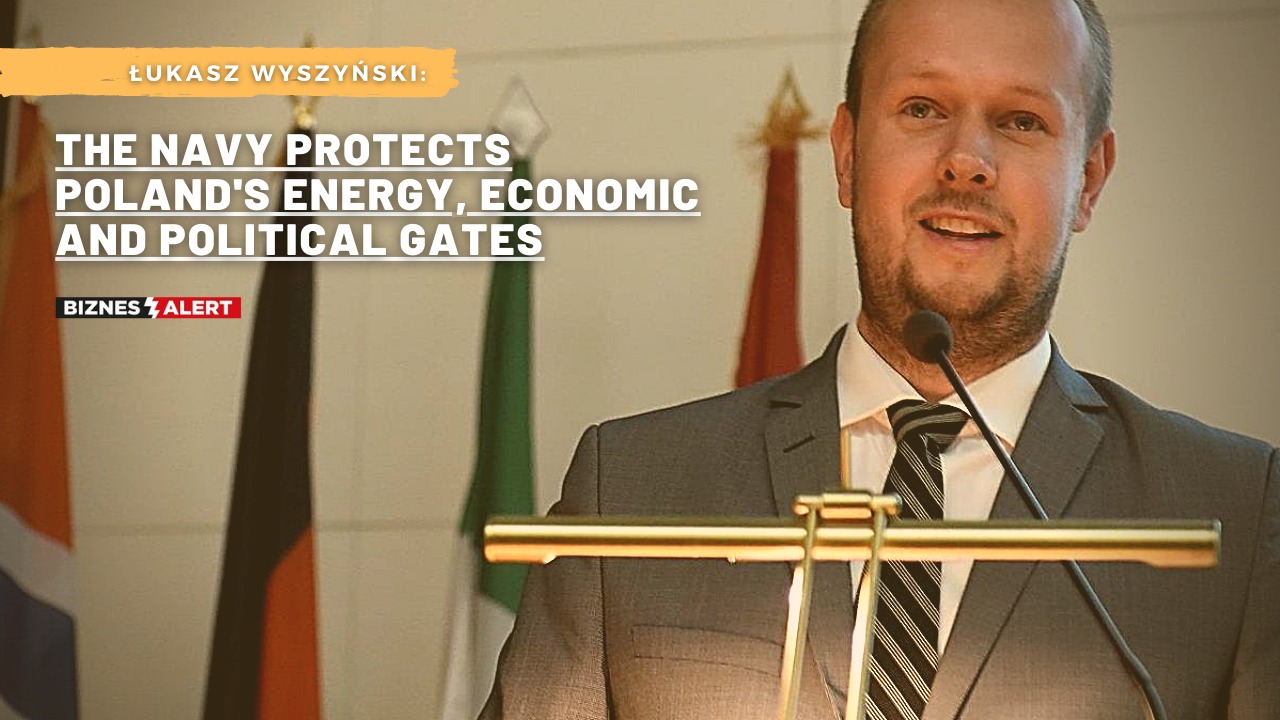The Navy is a type of armed forces that requires investments. Due to historical reasons the Polish society does not think about the sea in the context of benefits and profits. This is changing due to the ongoing investments, among others, in the energy sector, but this process takes time. However, the problem is that the Navy may no longer have it – Łukasz Wyszyński, PhD, from the Gdynia Maritime University says in an interview with BiznesAlert.pl.
BiznesAlert.pl: Why is the Balic Sea important for Poland? Is it just about sea access or something more?
Łukasz Wyszyński, PhD: First, the mentioned access to the Baltic Sea is Poland’s only and geographically direct access to marine areas. This shapes the other ways in which the access is perceived in our country. One is the ability to use Poland’s location in line with the law of the sea. On the basis of the so-called Yamal convention, Poland has territorial waters with an exclusive legal jurisdiction that is limited only by the right of innocent passage. We also have the right to scientific and economic exploitation of the exclusive economic zone. These conditions mean that Poland’s access to the Baltic Sea should be understood as a strategic issue – related to the Polish territory and direct area of interest. I could ask a provoking question about how we treat those places in Poland that have energy resources, or areas with extensive industrial and logistic infrastructure, or those that constitute a significant environmental and tourist value? We should perceive the Baltic Sea the same way – as our resource and our opportunity to, among others, develop our economy, diversify our energy sources, and use it as a tool to have an international impact.
And this is where we discover yet another perspective on Poland’s access to the Baltic Sea. The Sea is a kind of a „window to the world”. Let’s look at it this way – we are a NATO member, an alliance of states with access to the sea, which still have a decisive impact on the shape and security of the international shipping routes. We also belong to the European Union whose economic potential results from both the economic exchange on the continent as well as outside of it. In this case, the exchange also takes place mostly via shipping routes. This means the organizations that are to ensure our security in the military, economic and political spheres depend on export and import shipping routes of goods and energy raw materials. We, as part of this system, also have to take into consideration the above, as well as the fact that today the international system is undergoing dynamic changes and we are witnessing a kind of an interregnum where we are asking about the role the United States, China, Russia, the European Union and other players on the international arena. In this context, the access to the Baltic Sea offers Poland political and economic room to take action with its present and potential partners to shape the region and indirectly impact the international security system.
You explained the essence of the Baltic’s importance to Poland, but not just that. What role does the Navy play in this? Some of the critics of this kind of armed forces claim that the role of the Navy could be taken over by, e.g. the Border Services, while others propose that an airforce would be more suitable for the Baltic. Are they right?
The role and tasks of the Navy can be explained from two perspectives. In the narrative in the media, which dominates the discourse, the conversation is purely about its military aspect. This a very narrow view of the job, which the Navy is or may be responsible for. It has a lot of tasks that need to be performed at peaceful times or in an emergency (not during a war). I am talking about, among others, policing, patrolling, exploratory functions, rescue operations, hydrographic functions, and finally cooperation in protecting the ecosystem of the Polish waters and shores. It would probably be possible for other services to take over some of those tasks. However, the question is whether it would be cheaper and whether it would guarantee such a wide spectrum of possibilities? I do not know the answer to the first part of the question. However, the answer to the second one is no. It would be possible only in relation to some of the tasks performed during the so-called peaceful time, and a small number of jobs as part of the so-called military function. And when considering the latter, one should notice that the changes in armed forces in armies in different parts of the world show that the proportions between the different kinds of militaries are changing. However, the majority of states still maintain the navy, the land army and the airforce. This is because their distinct qualities provide various capabilities to perform tasks in relation to a specific theater of activities and in relation to different threats. What has been evidently becoming increasingly more important over the years is cooperation, network centric warfare and engagement in new areas, e.g. cyberspace. However, this topic is for a different conversation.
Coming back to the Navy, we need to answer the question for what do we still need it? We definitely need it to defend our territory, protect our territorial waters, interests in our exclusive economic zone and the shipping routes in our zone. Such an approach means our navy should be composed of smaller, littoral vessels, autonomous measures for reconnaissance and combat able to impact the opponent’s infrastructure, as well as capable of cooperating with other kinds of the military as part of the so-called defence operation. However, coming back to the conditions I have described earlier in response to your first question, we should notice that Poland has or should have a much wider perspective. It stems from our membership in NATO and the EU and the architecture of the international system. And this is where we should ask: do we need the navy just to secure our interests in the Baltic? If the answer is yes, then some of the claims against the model of functioning of the Navy may turn out to be right. However, if we think about the state policy and the marine policy in the context of our alliance policies, and our need to impact the global security system and the global shipping routes, the navy has to function within a structure that will facilitate the cooperation with our partners with regard to the Baltic, as well as other waters across the world. Only this approach will allow us to pursue our interests at a larger scale than just a few dozen nautical miles from Polish beaches.
Some are also suggesting that „we don’t really need a navy, because we have allies on the Baltic that will protect us.” Is this the right approach?
This approach is close to the assumptions of institutional neoliberalism about the international security system. International organizations, international law, agreements and profits from trade are to guarantee our security. However, your question goes even further – will they protect us? It means we need to assume that they have or will have the potential and capabilities to do this. And that at a time of crisis they will have the political will to engage in protecting the interests of state that gave up on its defence potential or cooperation. Such a vision seems way too optimistic. Moreover, to realize it we would have to take into consideration geopolitical benefits for the defenders, which could weaken our economic, energy and political sovereignty.
Today, at a time when the realistic perspective is returning, in my opinion neoclassical realism is the right category to consider. We should especially pay attention to the fact that in order to become a partner for other states and to encourage them to cooperate with us and to be ready to help us, we alone need to give something back – contribute to our own defence potential and capabilities to shape the security of the international environment. An example could the the work of the standing NATO maritime groups (SNMG-1 and 2 and SNMCMG1 and 2), which patrol the northern and souther waters of the NATO states, and secure anti-mine activities. Their presence stabilizes the security of shipping routes. The Polish Navy is engaged in those actions. It is up to a political decision whether we will maintain this engagement. The justification for it is that, among others, it protects our economy, trade and power sector.
This is where we approach an important issue. What threats can undermine the Polish interests in the Baltic and what equipment capabilities the Polish Navy should have to counter them?
When it comes to the vessels that we need, everything depends on the adopted strategy and the usage of the Navy and on the publicly available and the secret analyses. At this point it is difficult to tell what development strategy the Polish government will adopt for the Navy. It is a lot easier to answer the question about the threats. I can’t enumerate all of them, but I will try to point to those, which in my opinion are the most important.
The first one is securing the supply of all kinds of energy raw materials and ensuring the safety of shipping. This is not about providing convoys for LNG tankers between the producer country and Polish ports. However, the navy could participate in securing various waters, including the Baltic Sea, so that shipping can take place without interruption. If a conflict erupted on the Baltic, which would to a some degree destabilize the freedom of shipping, Poland would sooner or later feel its impact, both in the economic and energy security sense. In this area we also have to look at stabilizing, in cooperation with other states, but in line with our interests, the marine areas outside of the Baltic Sea.
Another point of concern are political-military and economic threats. The first that comes to mind is the Nord Stream 2 construction, which bypasses our waters. However, we should consider that the entity that has decided to pursue this investment takes into account the necessity to protect this investment in case of a crisis. It will not be left without protection. This should be a hint for us to think how, in case of a crisis, we should react to a threat. Perhaps even suggesting that we may impact such an installation, would stop other states from using it for political purposes that would go against Poland’s raison d’etat. When it comes to a military conflict itself, it seems unlikely that the military action would take place on the Baltic only. If a conflict between NATO and Russia erupts, it will have a global character, and the Baltic will be one of many theaters. It doesn’t look like the Baltic will be mired in a conflict in the nearest future; however, it may participate in a proxy war caused by the global rivalry between the US, Russia and China. This cannot be excluded. Perhaps we should ask whether this conflict is already taking place, just in a different area.
Looking at what you have said I do have one more question. In Poland there is this tendency to underestimate the necessity to secure our interest in the Baltic. Despite numerous investments, especially in the energy sector, this thinking is not changing. Why?
I believe there are a couple of factors at play. First, we are not a maritime state in the classic sense, i.e. a country that throughout its history has been closely connected to the maritime tradition and economy. We have never profited from being a seafaring power, we never had colonies. We are mostly a landlocked country and this sentiment is overwhelmingly popular.
The other issue are costs. It is increasingly difficult to explain to the society why we need to bear the costs of securing Poland against threats, especially ones that could come from the Baltic Sea. It is increasingly difficult, which has been visible throughout the pas few years, to explain to the citizens the necessity to spend a lot of money on military equipment. And this is especially challenging for the Navy. Purchasing 2-3 ships looks a lot more serious from a PR standpoint, than buying a dozen jets or several dozen tanks or helicopters. However, we have to remember what are the costs of maintaining our current economic development. We have to understand that the international situation is changing, and we should have the tools to shape it in a way that is beneficial for us. The Polish Navy seems useful and efficient to this end. In order for this to happen, it has to have certain capabilities and potential. Unfortunately, so far all modernization programs failed due to political (in)efficiency and costs. I hope there is still time to fix this.
Interview by Mariusz Marszałkowski









